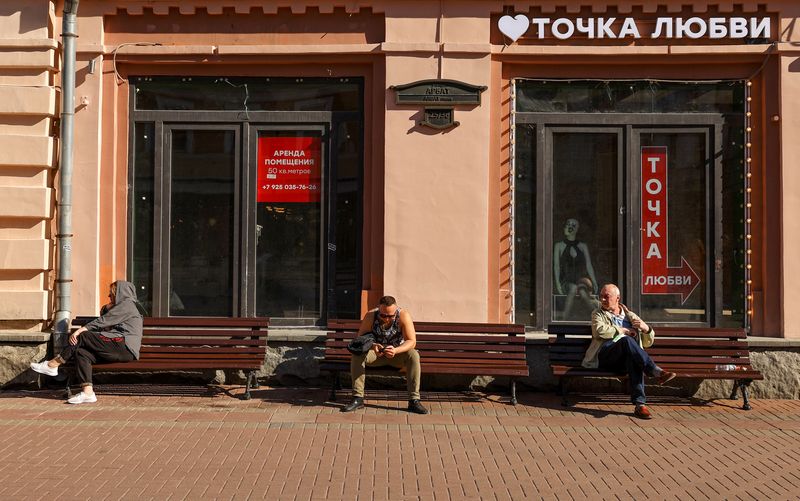Double-digit growth in real wages, retail sales as Russia’s unemployment hits record low
2023.08.02 13:10

© Reuters. People rest on benches near a window of business premises put out for rent in Moscow, Russia June 8, 2022. REUTERS/Evgenia Novozhenina/File photo
(Reuters) – Record low unemployment in June highlighted Russia’s stark labour shortage, statistics data showed on Wednesday, even as the rebound from last year’s economic slump continued with double-digit jumps in wage growth and retail sales.
Russia was hit with a barrage of Western sanctions when it invaded Ukraine in February last year, ultimately leading to a 2.1% contraction in gross domestic product (GDP) in 2022, a better-than-expected decline touted by Moscow as evidence of its economic resilience.
Moscow regularly cites low unemployment and other recovering indicators as a sign that its economy is on the up, but the shortage of workers, exacerbated by last September’s partial mobilisation for the conflict in Ukraine, is set to bite over the long run.
“The age pyramid, mobilisation and those who have left (the country) mean that for five years we will be trying to grow with a shrinking workforce,” veteran economist Natalia Zubarevich, a professor at Moscow State University, told a financial congress last month.
The defence sector is getting all the attention, while other areas struggle, she said.
“The worst crisis among those employed is in the industrial sector and construction,” Zubaervich said. “That’s where the trouble is and it’s not dissipating.”
Unemployment dropped to 3.1% in June, a new record low, said the statistics service, Rosstat. Retail sales jumped 10% year on year in June, having fallen by almost as much the year before. Real wages, data for which are reported with a one-month lag, climbed 13.3% in May.
Real disposable incomes in the second quarter rose 5.3% year on year, Rosstat said, having remained flat in the same period of 2022.
The statistics service revised the first-quarter rise in real disposable incomes to 4.4% from 0.1% estimated in May, without providing a reason for the significant change. Incomes fell 1.0% in 2022 as a whole.








